New Maldives leader Waheed Hassan denies coup claim
- Published
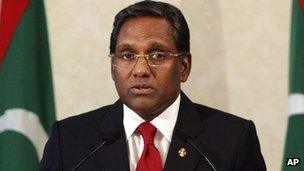
New President Mohammed Waheed Hassan says elections in 2013 will go ahead
New Maldives President Mohammed Waheed Hassan has said that it is unfair to describe the removal of President Mohamed Nasheed as a coup.
He said that there was no pre-arranged plan for him to stage a takeover.
But former President Nasheed says that he has been the victim of an organised coup.
He told the AFP news agency that he had been forced to resign by armed police and army officers in a plot hatched with the knowledge of his successor.
Mr Nasheed, speaking by telephone from the capital, said he had gone to military headquarters on Tuesday where he found about 18 "middle-ranking" police and army officers in control.
"They told me if I didn't resign they would resort to use arms," he said. "I took it as a threat. I wanted to negotiate the lives of the people who were serving in my government."
He added that he feared Mr Hassan - formerly his vice president - was "in on" their plans.
The new president in turn criticised Mr Nasheed for wrongfully arresting a top judge.
President Hassan said his aim now was to form a coalition to help build a stable and democratic country.
"We will respect the rule of law, we will uphold the constitution, the executive will not interfere in legislation and we will make sure that democracy is consolidated," he told a news conference on Wednesday.
Mr Hassan repeated his call for the formation of a national unity government to help the country recover from the political crisis that led to the resignation of his predecessor.
The authorities are also reported to be investigating the discovery of bottles of alcohol being removed from outside Mr Nasheed's residence.
Consuming alcohol outside tourist resorts is a crime in the Muslim nation.
Mr Hassan also promised to protect Mr Nasheed from retribution, pointing out that he was free to leave the country.
However he said he would not interfere with any police or court action against Mr Nasheed.
'Rogue elements'
The former president's resignation followed protests over the arrest of Justice Abdulla Mohamed last month.
He was released soon after Mr Hassan took power.
The judge was accused of being loyal to the opposition by ordering the release of a government critic he said had been illegally detained.
Mr Nasheed's supporters say that they fear for his safety as well as the safety of other senior members of his government.
Mr Hassan on Tuesday described Mr Nasheed's resignation as a "generous decision... because he has taken into consideration the call from the people and he has also helped to prevent bloodshed".
He pledged to hold elections in 2013 which would lead to the formation of a government of national unity which could bring "calm and quiet to the streets".
Mr Nasheed's resignation came within hours of a mutiny in police ranks which saw a few dozen officers side with protesters and then clash with soldiers in the streets.
The mutinying officers took control of the state broadcaster in the capital, Male, and began playing out messages in support of Mr Gayoom.
- Published8 February 2012
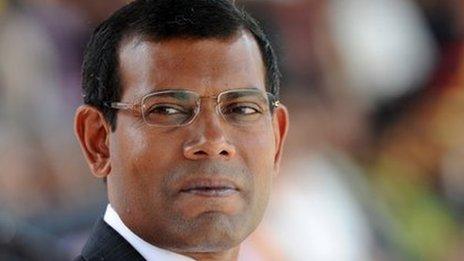
- Published7 February 2012
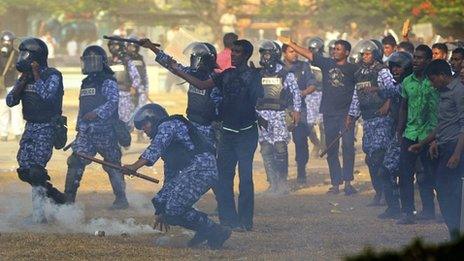
- Published7 February 2012
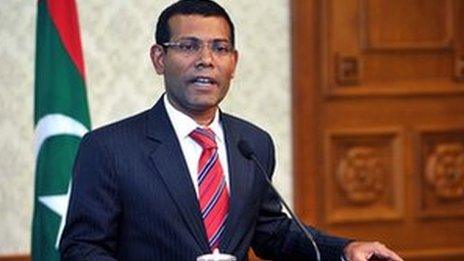
- Published10 March
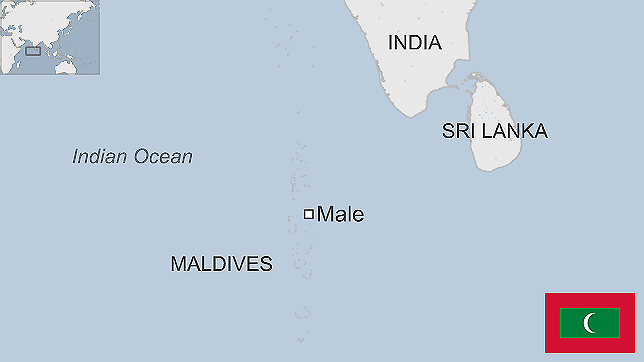
- Published23 January 2012
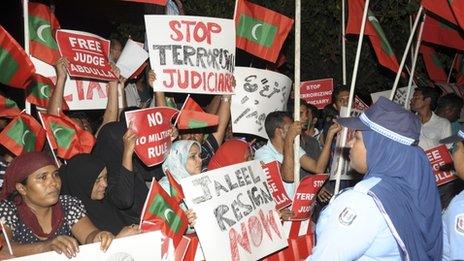
- Published17 January 2012
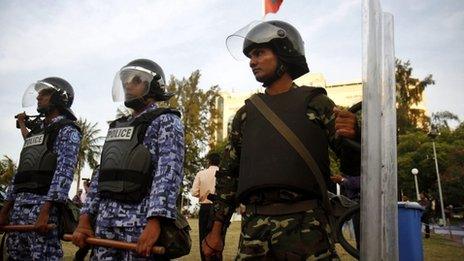
- Published24 September 2018